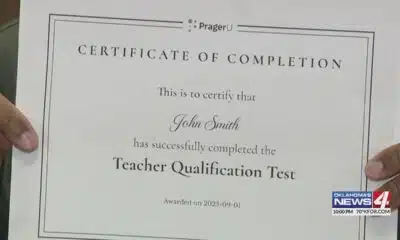(The Center Square) – In yet another reversal in an ongoing case against former U.S. Rep. Robert (Beto) O’Rourke, D-El Paso, the Fifteenth Court of Appeals has ordered that existing restraining orders already issued against him, his organization, Powered by People, and other groups remain in effect.
The case stems from O’Rourke, his group, and others raising millions of dollars for Texas House Democrats who left the state in opposition to a redistricting bill that passed the legislature and has now been signed into law.
The case was filed in Tarrant County District Court, 348th Judicial District, then appealed to the Fifteenth Court of Appeals, then an emergency filing was made with the Texas Supreme Court. Initially, Tarrant County Judge Megan Fahey issued a restraining order against O’Rourke and Powered by People, The Center Square reported. She later expanded it to include Act Blue, a Democratic Party online fundraising platform, and any other platforms or organizations they were working with that are transferring funds.
However, O’Rourke ignored the orders and continued to fundraise, prompting Texas Attorney General Ken Paxton to file a motion for contempt against O’Rourke, The Center Square reported.
Prior to a Sept. 2 hearing on the contempt motion, O’Rourke filed a mandamus petition with the Fifteenth Court of Appeals challenging Fahey’s orders.
In response, the appellate court halted the contempt hearing, effectively allowing Fahey’s orders to expire in an “historically unprecedented decision,” Paxton said. He then appealed to the Texas Supreme Court to reverse its decision.
In his appeal, Paxton points out that the appellate court requested his office respond to a 75-page petition in less than 24 hours, an “impossible deadline.” After his office filed a mandamus petition with the court, the appellate court issued an administrative stay of the Sept. 2 hearing “without providing the State an opportunity to respond,” he argued.
The court’s actions would have enabled O’Rourke to continue fundraising, “without even allowing the State to respond and prove to the court how he’s hurting Texans,” Paxton said. The appellate court’s ruling was an “insult to the people of Texas, an affront to our judicial system, and a disastrous precedent if allowed to continue without being reversed,” he added.
A week later, the appellate court reversed its ruling “to preserve this court’s ability to fully review” the original proceedings, it said in a one paragraph order. It also put back into effect Fahey’s orders issued against O’Rourke, Powered by People and ActBlue. It said her temporary restraining order and emergency temporary restraining order “shall remain in effect” until the appellate court reaches a decision.
Paxton said the reversal was “a welcome development.”
He also said House Democrats who left the state “abandoned Texas at the behest of financial backers who promised them money for fleeing the state and abdicating their responsibilities. Texas is not for sale, and Beto must face justice for his illegal bribery scheme.”
The appellate court’s order prevents O’Rourke, Powered by People, and any of its institutional partners, including ActBlue, from removing any property or funds out of Texas.
O’Rourke said in a social media post that he faces criminal contempt charges, bribery accusations, his Texas-based assets have been frozen, and he and his organization have “racked up over $300,000 in legal fees” in the last two weeks of August.
He denies that he has broken any laws after he continued to fundraise and post videos of him doing so, including posting links to fundraising appeals.
He is also encouraging his followers and supporters to “continue the fight by whatever means necessary.”












































